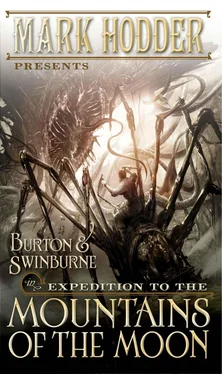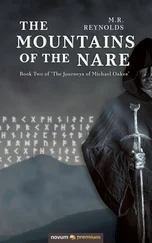Mark Hodder - Expedition to the Mountains of the Moon
Здесь есть возможность читать онлайн «Mark Hodder - Expedition to the Mountains of the Moon» весь текст электронной книги совершенно бесплатно (целиком полную версию без сокращений). В некоторых случаях можно слушать аудио, скачать через торрент в формате fb2 и присутствует краткое содержание. Жанр: sf_stimpank, на английском языке. Описание произведения, (предисловие) а так же отзывы посетителей доступны на портале библиотеки ЛибКат.
- Название:Expedition to the Mountains of the Moon
- Автор:
- Жанр:
- Год:неизвестен
- ISBN:нет данных
- Рейтинг книги:5 / 5. Голосов: 1
-
Избранное:Добавить в избранное
- Отзывы:
-
Ваша оценка:
- 100
- 1
- 2
- 3
- 4
- 5
Expedition to the Mountains of the Moon: краткое содержание, описание и аннотация
Предлагаем к чтению аннотацию, описание, краткое содержание или предисловие (зависит от того, что написал сам автор книги «Expedition to the Mountains of the Moon»). Если вы не нашли необходимую информацию о книге — напишите в комментариях, мы постараемся отыскать её.
Expedition to the Mountains of the Moon — читать онлайн бесплатно полную книгу (весь текст) целиком
Ниже представлен текст книги, разбитый по страницам. Система сохранения места последней прочитанной страницы, позволяет с удобством читать онлайн бесплатно книгу «Expedition to the Mountains of the Moon», без необходимости каждый раз заново искать на чём Вы остановились. Поставьте закладку, и сможете в любой момент перейти на страницу, на которой закончили чтение.
Интервал:
Закладка:
“We're about a week away from Kazeh,” Burton said. “It's an Arabic town, a trading centre, and it marks the end of our eastward march. It's where we'll restock with food, hire new porters, and buy new animals, before heading north to the Ukerewe Lake and the Mountains of the Moon. Speke will be following the same route and no doubt intended to obtain fresh provisions there too, but perhaps he couldn't make it. I'd lay money on him having squandered all his supplies between Mzizima and here.”
“So Tura bore the brunt of his ineptitude,” Krishnamurthy growled.
Some of the Daughters of Al-Manat were patrolling the outskirts of the village. One of them now reported that a body of men were approaching from the west. They were carrying guns, in addition to the usual spears and bows.
Burton hurried over to where the women of Tura were sitting together and addressed them in their own language: “Men are coming, perhaps Wanyamwezi. If they've heard what has happened here, they will assume my people are responsible and they will attack us.”
One of the women stood and said, “I will go to meet them. I will tell them of the white devils who killed our men and I will say that you are not the same sort of devil and that even though you are white you have been good to us.”
“Thank you,” Burton replied, somewhat ruefully.
As he'd predicted, the new arrivals were Wanyamwezi. They stamped into Tura-two hundred or so in number-and levelled their weapons at the strangers. They were mostly very young men and boys, though there were a few oldsters, too. All were armed with matchlock rifles; all bore patterned scars on their faces and chests; all frowned at Burton and his associates; and all bared their teeth, showing that their bottom front two incisors had been removed.
From among them, a man stepped forward. He was tall, gaunt, and angular, but powerfully built, with long wiry pigtails hanging from his head. There were rings in his nose and ears and a profusion of copper bangles on his wrists and ankles.
“I am Mtyela Kasanda,” he said. “They call me Mirambo.”
It meant corpses.
“I am Burton,” the king's agent responded. “They call me Murungwana Sana of Many Tongues.”
“Dost thou see mine eyes?” Mirambo asked.
“I do.”
“They have looked upon thee and they have judged.”
“And what did they find?”
Mirambo sneered. He checked that there was priming powder in the pan of his matchlock. He tested the sharpness of his spear with a fingertip. He examined his arrow points. He cast an eye over his warriors. “Mine eyes see that thou art muzungo mbaya , and therefore bad.”
“My people are the enemy of those who destroyed this village. We found the women injured, and we helped them.”
“Did doing so darken thy skin?”
“No, it did not.”
“Then thou art still muzungo mbaya.”
“That is true, but, nevertheless, we remain the enemy of those who did this deed.” Burton held his hands open, palms upward. “We have come to help thee.”
“I will not be friends with any muzungo mbaya”
Burton sighed. “I have learned a proverb from thy people. It is this: By the time the fool has learned the game, the players have dispersed. ”
Mirambo turned his head a little, chewed his lip, and regarded Burton from the corners of his eyes. He coughed and spat, then said, “I understand thy meaning. If I do not choose, I will have no say in the outcome.”
“That is probably correct.”
There was a sudden commotion among the gathered warriors and a small man pushed his way to the front of them. He was wearing a long white robe and a white skullcap, with a matchlock rifle slung over his shoulder and a machete affixed to his belt. At the sight of him, Burton felt a thrill of recognition.
“Wow! I know this scar-faced man, O Mirambo,” the newcomer announced. “I have travelled far and far with him. He is ugly and white, it is true, but he is not as those who passed before. He is fierce and loyal and good, though filled with crazy thoughts. I speak only the truth.”
The Wanyamwezi chief pondered this for a few moments, then said to the man: “Give me pombe , Sidi Bombay.”
The small man took a goatskin flask from one of his companions and handed it to the chief. Mirambo drank from it then passed it to Burton, who did the same.
“Now,” Mirambo said. “Tell me of our foe.”
The season of implacable heat arrived, and each morning they struck camp at 4 a.m., walked for seven hours, then stopped and did their best to shelter from it. It meant slow progress, but Burton knew Speke wouldn't be able to move any faster.
Their first three days from Tura saw them trekking over cultivated plains. The sky was so bright it hurt their eyes, despite that they wore keffiyehs wrapped around their faces.
The Daughters of Al-Manat, now supplemented by the vengeance-bent women of Tura and their children, rode and walked to the right of the porters.
Mirambo and his men marched on the other side of the column, keeping their distance, holding their matchlocks at the ready and their heads at an aloof angle. Sidi Bombay, though, walked along next to Burton's mule, for he knew the explorer of old, and they were firm friends.
A one-time slave who'd been taken to India then emancipated upon his owner's death, Bombay spoke English, Hindustani, and a great many African languages and dialects. He'd been Burton's guide during the explorer's first expedition to the Lake Regions in '57, and had then accompanied Speke on his subsequent trek in '60. Burton now learned that he'd also accompanied Henry Morton Stanley, last year.
As they pushed on across a seemingly unchanging landscape, Bombay cast light on some of the mysteries surrounding the latter two expeditions.
Burton already knew that, after discovering the location of the African Eye of Naga in '57 but failing to recover the jewel, Speke had returned to Africa with a young Technologist named James Grant. They'd flown toward Kazeh in kites dragged behind giant swans, but, en route, had lost the birds to lions. He now learned that when they'd arrived at the town on foot, they'd hired Bombay to guide them north to the Ukerewe Lake, then west to the Mountains of the Moon.
“Mr. Speke, he led us into a narrow place of rocks. Wow! We were attacked by Chwezi warriors.”
“Impossible, Bombay!” Burton exclaimed. “The Chwezi people are spoken of all over East Africa and all agree that they are long extinct. Their legendary empire died out in the sixteenth century.”
“But perhaps no one has told them, for some have forgotten to die, and live in hidden places. They guard the Temple of the Eye.”
“A temple? Did you see it?”
“No, Mr. Burton. It is under the ground, and I chose not to go there, for I met my fourth wife in an ill-lit hut and I have never since forgotten that bad things happen in darkness. So I remained with the porters and we held back the Chwezi with our guns while Mr. Speke and Mr. Grant went on alone. Only Mr. Speke came back, and when he did-wow! — he was like a man taken by a witch, for he was very crazy, even for a white man, and we fled with him out of the mountains and all the way back to Zanzibar. On the way, he became a little like he was before, but he was not the same. I think what he saw under the ground must have been very bad.”
Stanley's expedition had also ended in disaster. The American newspaper reporter's team-five men from the Royal Geographical Society-had employed porters to carry rotorchairs from Zanzibar to Kazeh, then flew them north to locate the source of the Nile. They'd returned a few days later, on foot. Their flying machines had stopped working.
Читать дальшеИнтервал:
Закладка:
Похожие книги на «Expedition to the Mountains of the Moon»
Представляем Вашему вниманию похожие книги на «Expedition to the Mountains of the Moon» списком для выбора. Мы отобрали схожую по названию и смыслу литературу в надежде предоставить читателям больше вариантов отыскать новые, интересные, ещё непрочитанные произведения.
Обсуждение, отзывы о книге «Expedition to the Mountains of the Moon» и просто собственные мнения читателей. Оставьте ваши комментарии, напишите, что Вы думаете о произведении, его смысле или главных героях. Укажите что конкретно понравилось, а что нет, и почему Вы так считаете.












